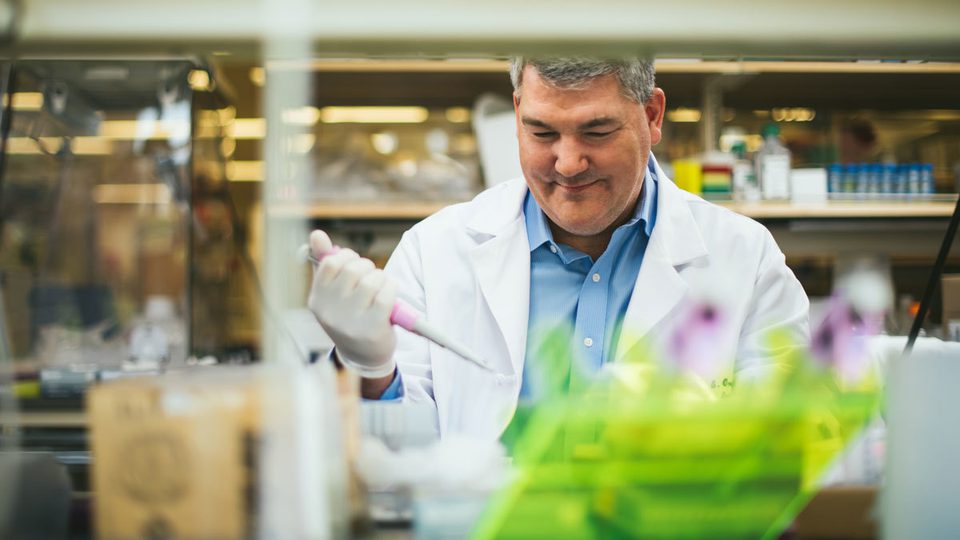Dr. Kyle Orwig: Preserving Fertility of Cancer Patients

When it comes to infertility, Dr. Kyle Orwig pushes the envelope of what’s possible
I think our job as educators is to get people to think beyond the boundaries about what reproductive medicine could look like tomorrow.
Dr. Kyle Orwig
In Dr. Kyle Orwig’s laboratory, the ultimate goal is helping people achieve the dream of having their own families, even when they thought it was biologically impossible.
Whether it’s restoring fertility to survivors of childhood cancer or developing technology designed to repair the genetic causes of infertility, Orwig lives to push the scientific boundaries of his field.
“If you understand the history of reproductive medicine, you understand where the biases are and maybe where the perceived boundaries are,” he says. “And I think our job as educators is to get people to think beyond the boundaries about what reproductive medicine could look like tomorrow.”
Chemotherapy and radiation treatments cause infertility in about 30 percent of cancer patients. Adults have the option of freezing their eggs or sperm in advance of the therapy. But in the case of prepubescent boys, they aren’t making sperm yet. Girls are born with their lifetime supply of eggs, but until puberty, the eggs are immature.
To help young boys have a chance at fertility, Orwig retrieves sperm stem cells from young male patients by extracting tubules, which are spaghetti-like strands in the testes that contain the cells. When those cells or tubules are transplanted back into the same adult male years later, the hormones produced by the brain after puberty trigger sperm production.
Orwig was appointed the founding director of the Fertility Preservation Program of Magee-Womens Hospital of UPMC in 2010 and established experimental protocols to freeze testicular tissues for boys and ovarian tissues for girls. He treated his first patient – a 9-year-old Florida boy with Ewing’s sarcoma – in January 2011. To date, he has frozen testicular and ovarian tissues for more than 240 patients. No babies have been born from frozen testicular tissues to date, but the Fertility Preservation Program is approved to begin testing enabling technologies in the clinic that will lay the foundation for the first transplants. Worldwide, more than 150 babies have been born from ovarian tissues that were transplanted back into mothers who had preserved the tissue in the past. The program is now approved to perform ovarian tissue transplants in Pittsburgh, which will establish UPMC as a key referral destination in the US for women who have frozen their ovarian tissues.
“One of our most important outreach efforts has been to educate patients and their oncologists about the fertility risks associated with their treatments and that there are options to preserve fertility,” Orwig says. “The oncologists were appropriately focused on treating the cancer, and some didn’t want to burden patients and their families with information about fertility issues in the compressed timeframe between diagnosis and the beginning of treatment.”
But Orwig persevered: “We established a dedicated fertility preservation phone line and email account that is continuously monitored by outstanding program navigators, Dr. Hanna Valli-Pulaski and Sarah Steimer, who coordinate with the oncologists to provide counseling and facilitate treatments in a timely manner.
“It turns out having a biological child is very, very important to people,” he says. “It’s easy for people who aren’t infertile to say, ‘What’s the big deal? Just go adopt.’ But this is a very personal thing, and to some people it’s a very big deal.”
Of the tissue Orwig’s lab takes from patients, approximately 75 percent is reserved for their future use, and 25 percent is designated for research. Orwig’s patients have expressed support for him using those research tissues to develop next generation reproductive technologies that may allow them to use their tissues in the future. The patients also appreciate that the research will benefit others, because they recognize the importance of that contribution.
“Patients are our best collaborators,” he says. “They are altruistic. It’s amazing how they have that sense.”
Approximately 10 to 15 percent of couples are infertile, with the causes equally distributed between men and women.
“There are few other diseases that are that prevalent, and infertility is a disease,” says Orwig, even though our culture has not always recognized it as such. Moreover, the stigma of infertility keeps many people silent through their ordeals.
“Beyond just not being able to have a baby, the psychological impact of being infertile is extraordinary -- because you’re not sharing your story; you’re not sharing your struggle. This puts hidden strain on the infertile individuals, their relationships and their families,” he adds.
So he has dedicated his career to solving the problem on multiple fronts. In addition to childhood cancer patients, he also has focused on other seemingly intractable cases: a patient with genetic infertility and no sperm. Patients who will be rendered infertile by their medical treatments. Patients with Klinefelter’s syndrome, in which a male carries an extra X chromosome.
One day Orwig imagines that it will be possible for patients with no eggs or no sperm to have biological children. Cures for those conditions are already in the research pipeline and Orwig believes they will be available in the fertility clinic of the future.
“Our work is inspired by the patients that we meet,” he says. “We are dedicated to developing the next generation of reproductive technologies to ensure that they can have the biological children that they desire. We are not satisfied to just prove principles in the basic research laboratory; we want to responsibly translate those discoveries into clinical practice. This defines our mission and Magee/UPMC provides the ideal environment to achieve those goals.”
Be the First to Know
Get the latest research, news, events, and more delivered to your inbox.